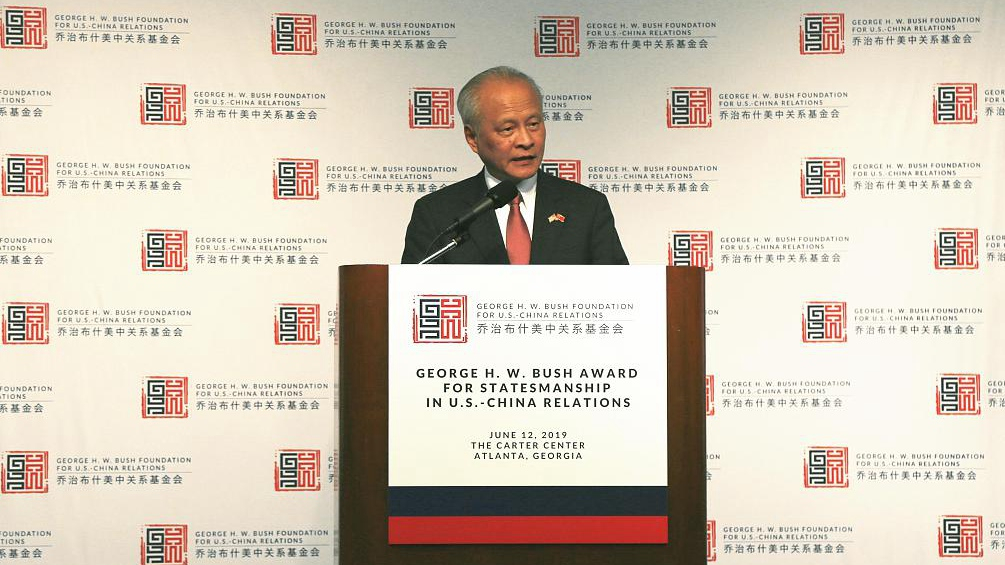

When U.S. President Donald Trump first opened fire on China over trade, he didn't trigger as broad of a global opposition as we see today. China does also run disputes with other economies and has been urged to make policy changes.
However, as the row between China and the U.S. continues to develop, Trump has stepped over the line at some point. From the initial focus on the trade imbalance to what is now regarded a multi-front battle where the U.S. takes on China on almost all issues possible, it has become obvious that what motivates him is much larger than the trade disagreement; the trade war, in essence, represents the U.S. administration's do-or-die attempt to prevent a China-dominated world.
Now many international observers and analysts who understand where U.S. grievances towards China's economic practices initially came from have spoken out against Trump's objectives and strategies.
The president has made two major mistakes: One concerning how the U.S. should view China, and another concerning the way the two countries should negotiate if the U.S. does want a deal.
Singapore's Prime Minister Lee Hsien Loong was one of the most prominent figures who have recently spoken on the matter. During the keynote speech at this year's Shangri-La Dialogue, he called on China and the U.S. to end their prolonged tensions, which he believes are severely damaging to the world.
As the U.S. establishment views China's ascent to global prominence with increasingly strong suspicion, Lee suggested that there was another way of thinking – looking back in history, China's transformations are by no means a threat to the U.S. or China; on the contrary, by developing itself, China has avoided exporting its own problems to the world. Moreover, as the Chinese economy took off, Lee said it has greatly benefited ASEAN countries, both in terms of boosting their economic growth and co-operating with them in regional affairs.
The way Lee sees China's rise presents a stark contrast with the prevailing attitudes in the U.S., which stem from a deep-seated zero-sum game mentality. Martin Wolf, chief economics commentator at Financial Times, also called attention to the danger of such a tendency of framing relations with China as zero-sum. In an article published in the Financial Times, he pointed out that such an approach is extremely worrying as it hints at the possibility of long-lasting conflicts that could cause "everyone else to take sides or fight hard for neutrality." He also argued that the right way to deal with China was treating it "with respect" and "a blend of competition and co-operation."

A general view of the Yangshan Deep-Water Port, an automated cargo wharf, in Shanghai on April 9, 2018. /VCG Photo
Apart from seeing China as an existential threat, another mistake Trump has made relates to how he went about trying to address the two countries' disagreement on specific economic matters. There is no doubt that considerable difference does exist in areas such as the openness of the market, IP protection, etc. However, Trump's high-pressure tactics certainly did not and will not work. The assumption that China will bow to U.S. demands since it has a weaker hand is misplaced. What has happened over the past week serves as excellent proof.
Early last month, just when there seemed to be much optimism about China and the U.S. reaching a deal, the Trump administration abruptly and arbitrarily changed the course with the surprise announcement of raising tariffs on Chinese imports from 10 percent to 25 percent. This has triggered an angry response from the Chinese side with strong media reactions and the government issuing official papers clearing its positions on the negotiations and the trade war at large. None of these had any indication that China is likely to give in to U.S.' unreasonable demands because of the pressure.
On this, the former Australian Prime Minister Kevin Rudd has a much better understanding than Trump does. Rudd said in an article in the New York Times, by acting as if the U.S. has the authority to dictate the terms of an agreement, Trump has, in fact, helped to stir up a higher wave of nationalist sentiment among the Chinese. If his real aim is to change China's economic practices, this tactic will only fail him in achieving what he had desired.
This should give the U.S. administration clues as to how to work with China if they are sincere about nudging China to change specific policies that they thought had largely disadvantaged U.S. businesses. Again, the Chinese government's position set out in its recently released white paper proved this point well. The white paper forcefully argues that the two countries' consultations should be based on mutual respect, equality and mutual benefit. This should be the basis of negotiation.
Therefore, it is indeed high time that the China hawks in the U.S. administration rethink these questions: How should the two sides settle their disputes? In what way can the differences be resolved? Is the U.S. able to dictate China's economic rules? And last but not least, is China's rise equal to substantial threats to America and the world?
(If you want to contribute and have specific expertise, please contact us at opinions@cgtn.com.)

Copyright © 2018 CGTN. Beijing ICP prepared NO.16065310-3
Copyright © 2018 CGTN. Beijing ICP prepared NO.16065310-3